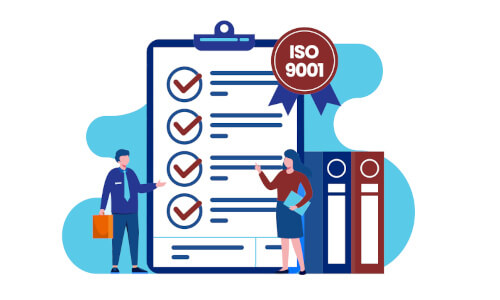What is an ISO 9001 Quality Management System? – Insight
When choosing a manufacturer to trust with your product, the stakes are high. Selecting a low-quality producer can affect your reputation (not to mention your bottom line) for years to come. So you’ll want to work with a manufacturer that has a solid quality management system (QMS) in place.
Many top manufacturers advertise their ISO 9001 QMS certifications, and asking about them during vetting is an intelligent move. In this article, we’ll thoroughly define ISO 9001 and explore what makes a facility with a certified QMS appealing, as well as whether or not certifications make audits redundant.
What is an ISO 9001 Certification?

ISO 9001 is the international standard of requirements for a quality management system (QMS). Certified businesses have been confirmed to meet or exceed these QMS requirements.
Any organization, regardless of size and field of activity, can be certified to ISO 9001. It’s entirely based on the quality of the management principles. ISO 9001 certification focuses on a variety of criteria, including:
- Properly documented QMS standards
- Management responsibilities
- Resource management
- Product realization
- Measurement and analysis of the QMS process and its effectiveness
- Consistent improvement of the QMS over time
The process of certification generally follows this outline:
- A certifying body visits the facility seeking certification.
- They verify that the company has compliant QMS processes in place that are actively followed and documented appropriately.
- If the QMS is up to standard, the certification is issued.
ISO 9001 is not the only certification put forth by the International Organization for Standardization (ISO). Some suppliers may also choose to certify to ISO 14001 for their environmental management system, ISO 17020 for a conformity assessment, or ISO 13485 if they produce medical devices.
What is a Quality Management System?

A quality management system is a formalized process that documents a company’s procedures for achieving set quality standards. A QMS helps an organization meet regulatory requirements, satisfy customers, and continuously improve the business’s efficiency, effectiveness, and product quality.
Essentially, a QMS is a formal process for ensuring diligent quality control, and the ISO 9001 certification verifies that a company has one.
Why is a Quality Management System Important?
A manufacturer’s QMS affects nearly every aspect of its performance. A comprehensive and well-documented QMS has numerous benefits, such as:
- Prevention of mistakes and major deficiencies
- Waste Reduction
- Lower Costs
- Defined and controlled business processes
- Continuous improvement of business processes
- Training opportunities for staff
- Clearly established business goals
- Consistent and quality controlled products
- Improved customer satisfaction
- Strict adherence to company and regulatory requirements
- Improved supply chain
Does an ISO 9001 Certification Make Audits Redundant?

In short: no. Having an ISO 9001 certification is an excellent endorsement of a facility. It means they have taken on the cost and effort to show that they have a rigorous QMS in place. However, certification alone doesn’t mean that a factory will always provide perfect products. You still need to do your due diligence to ensure your manufacturer is still following their QMS, particularly overseas.
It’s always a good idea to conduct regular inspections and supplier audits regardless of your manufacturer’s certification status. For example, specific areas of concern can be investigated when setting the criteria for client-driven audits. Audits can also check for potential issues beyond the scope of ISO 9001.
Certification renewal is required every three years, but a lot can change in that span of time. Management changes, policy changes, supplier changes, and shifts in international standards may necessitate an audit on your end. It’s always worth checking back in before you risk a shoddy product order.
How Often Should You Audit?
You should always conduct an audit before you work with a new supplier. Beyond that, a good benchmark to aim for is an audit every 12-18 months.
Frequency should also be based on the grade of the previous audit. If an audit shows excellent results, you may feel comfortable scheduling your next audit further out. If an audit yields poor results, you should schedule the next one sooner. Additionally, if your manufacturer fails their audit, you should confirm that whatever corrective actions they’ve promised are successful and consistent moving forward.
Insight Quality Services
Contact Insight today to schedule a consultation or to learn more about Insight’s quality audit services. You can also download our free guide on how to prepare for a factory audit.






